Discussing the future of space travel and Elite’s long-awaited PlayStation debut with David Braben
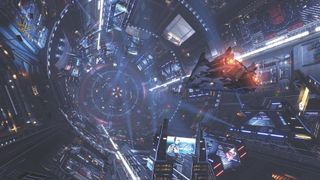
This interview was conducted by Official PlayStation Magazine
Elite Dangerous: Horizons changed forever on 5 January. Before then, the PC and Xbox One sci-fi simulator was a deep-space adventure filled with inter-player wranglings, political flashpoints and only small hints at there being something larger at play. But on 5 January a major event occurred: Commander DP Sayre was ripped out of a hyperspace jump and his ship was temporarily stripped of power as a massive alien Thargoids ship made first contact.
It was a game-redefining moment to kick off what’s set to become the biggest year yet for Elite’s newest form: the alien invasion has been years in the making, and to top it off Frontier Developments’ celebrated space saga will finally make its PS4 debut in a few months’ time. So we caught up with the man who started it all to discover why Elite Dangerous: Horizons is one of PS4’s most important games yet.
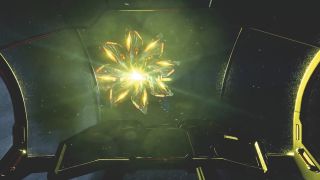
OPM: Rewinding back to when you first made Elite in 1984, did you imagine it would have the impact that it had and that you’d get to make a project like Elite: Dangerous over 30 years later?
David Braben: I’d obviously hoped that. I mean if you’d have asked me what the world would be like now, I would say that we’d be on a moon base. If you think of the progress, it had already started to tail off in the ’80s but at least we had the promise of space shuttles and that sort of thing.
In ’82 or ’83 I remember thinking: “Why hasn’t anyone done a 3D game?” There were games that called themselves 3D but they were mostly sprites going bigger and smaller. In ’83 I was quite down in the dumps a little bit because the publishers we’d spoken to weren’t interested in what we had. They were going: “Oh, it’s technically very interesting but will it be a good game?” And we went to see Acorn, and they were the opposite. Acorn was made up of people like us, really. They were enthusiastic. Their offices were messy, not shiny. One of the things I loved about the Acorn offices on Market Hill was that you had to sort of almost go climb past the dustbins to get into it.
And so in ’84 I was very upbeat because I thought once we got Elite out there, hopefully there will be enough people [out there], because we’d written the game assuming the audience was quite like us; we wanted it to be quite difficult and we wanted it to be adventurous and exciting – all that sort of thing. I suppose the cynic in me thought something would go wrong, and some things have gone wrong, but they’ve been little things that we’ve been able to sort out.
Sign up to the GamesRadar+ Newsletter
Weekly digests, tales from the communities you love, and more
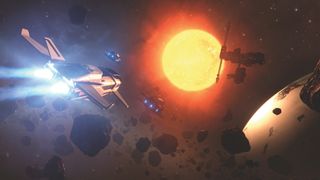
OPM: And what about the future of mankind? Do you think the fantasy of Elite’s premise – of us owning spaceships and reaching out into the unknown and trading and all of that – can ever become reality in the far future? Or will it forever remain nothing but fiction?
DB: Sadly, I don’t think we’ll get to know. A lot of the vision is possible, but one of the key enablers is faster-than-light travel, which I don’t see [being cracked] because even though there are some theoretical ways of getting very close to the speed of light, it’s very hard to imagine unless there’s a huge breakthrough. There are some sorts of ways that things might be possible when you start talking about how subatomic particles travel, but people are very complicated things to move around. It’s not just the vast distances and speed, it’s the g-forces as well. We’re basically bags of water and we can’t take really fast accelerations, so I think there are a lot of dangers that we haven’t really faced up to.
The way the story in the game goes, it’s sort of bypassed, but we feature other elements in our story; the rise of non-biological routes like AI, for example. It’s very hard to imagine that, at some point, that doesn’t just become our future. Whether we are somehow the AI ourselves because we’re moved onto silicon... whether, Skynet-style, they take over... It’s hard to imagine something like that not happening at some point, and I think that would actually enable this sort of future in a bizarre way, because then the ability to fast-travel, or the ability to be hugely long-lived, all becomes possible.
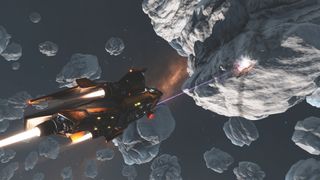
OPM: You’re trying to recreate the entire galaxy inside Elite Dangerous: Horizons. Does facing such vast constructions every day make you, and us, feel kind of small?
DB: I’ve been interested in astronomy for a very long time, which has probably come across in some of my games! I find the whole idea of just how tiny the Earth is, even in our solar system, incredibly humbling in the sense of how everything is so small. One of the things that I really wanted to get across – and hopefully we have – is just the vast scale of our galaxy. Even the distance between stars is huge. The very fact that you can travel so fast in the game does shrink it a bit, but it still feels utterly vast. We’re trying to get that majesty together at the same time. We’ve now got scales all the way down, down to where you’re driving a little vehicle and you can see that your spaceship itself is actually pretty big; and at the top end of the scale you’ve just got these ridiculous distances which are mind-boggling, and where the speed of light is actually quite slow.
We’ve touched on the concept of the Missing. So the Missing are, well... when humanity could first go into space, you could buy, or a group of a hundred people could buy, a vehicle to get on and just head off into the unknown. It would be completely unregulated, and that’s essentially what’s happening in our game. So quite a lot of them did make it, and they set up much like exploring the US in the 16th/17th/18th Centuries, founding various towns and so on. But quite a lot of those wagon trains never made it, and maybe 50 years or 100 years later someone would say: “Oh, what’s all this wreckage here?” Something bad happened to them, whether it was a storm, whether it was being attacked, or sort of thing. I love the concept of the Missing, who are the people who didn’t make it.
Some have been discovered already: places where the Missing set up something like a base, but they never quite made it because they’d have to have lived for hundreds of years having travelled such a distance. Going right back to the original game, there was a concept of generation ships, which are ships where people set off in the full knowledge that it’s going to take generations to make the distance and live while travelling at sub- light speed. Basically travelling on today’s technology where you could plausibly, in a few generations, reach a nearby star system, but you’ve got to completely rely on the fact nothing goes wrong, or at least the things that do go wrong can be repaired en route, because if they’re not repaired they’re just going to go on and on on that trajectory and never slow down.
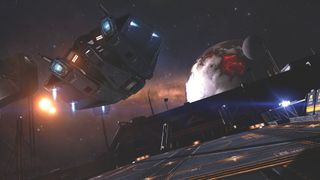
OPM: With games now moving away from traditional boxed products and more into the realm of continual services, has Elite reached its final form?
DB: I do hope so. I mean, I think the final form varies. It’s one of those strange things. If you look at the game today, it’s getting so much better – we’re putting so many more things in that I think we’re moving towards the final game, but it’s still a long way away. I’m sure if you asked JK Rowling when she was writing the first Harry Potter whether she expected to get the success she got from writing all those books and then all the films... I’m sure things changed a little bit!
We’ve sort of laid out what our plot is, but we don’t know the details. Our unfolding story is very interesting. It’s not really storytelling in the traditional sense; it’s led by our players. We’re creating lots of interesting things and places for the players to take the story to. It’s a story that genuinely involves lots and lots of people. PlayStation 4 players actually join us at a great time, because we’re just at the beginning of the real story flow.
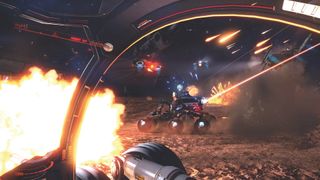
OPM: You’re very proud of the fact that Elite’s community is responsible for shaping the story through their actions. Is there a risk attached to handing players control of your game’s path?
DB: Well, I think we get a lot more richness this way. We’ve got to have an eye on making sure that we don’t end up in a dead end, but I don’t think we will. Think of it almost like a role-playing game with us playing the gamesmaster: the players can do completely unexpected things within the framework.
So in terms of how the story unfolds, this is an interesting way to go forward. I find it really exciting. There are a lot of secrets in the game now, and it’s very interesting to see how they unfold: how people find them and what people do when they find them.
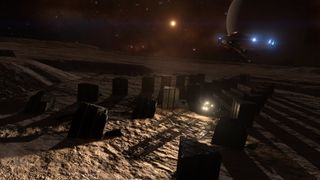
OPM: You actually had players who located the secret ancient ruins coordinates by looking at the teaser trailers and then using the stars in the sky to plot a course to the relevant planet...
DB: Yes. That is incredible, because you’re essentially recognising patterns of dots in the sky. It’s a real achievement to recognise constellations that don’t match our own. The way Commander XDeath, who was the guy to first discover them, managed it was he saw where Andromeda is in the sky and that the stars in front of it were just slightly different to the relative positions that you’d expect, and tried to work out where the image was taken. Our video was actually taken directly from the game – someone in the office did joke that we should paint out some of the stars, but as everyone could see, we didn’t.
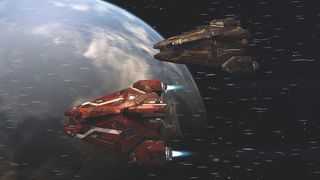
OPM: A lot of PS4 players might look at Elite Dangerous: Horizons’ premise and draw comparisons with No Man’s Sky. Would that be fair? What sets you apart?
DB: They’re both space games, obviously, but they’re very, very different. Consider first-person shooters – there are so many different versions of first-person shooters which come at things very differently. Here, the Venn diagram only just intersects. Okay, we have planets and spaceships that travel between them, but the way we do it is so different. No Man’s Sky doesn’t have a lot of the things we have, and there are things in No Man’s Sky that we don’t have.
We’re trying to do, and I think have very successfully done, a representation of our whole galaxy; the real galaxy. We’ve not just plucked big numbers, but it’s looking at what’s there and gradually building it out with a lot of content. No-one’s questioned it’s beautiful as a game, it’s just very different.
I remember a long time ago when talking about an Elite-type game with publishers, they said: “Oh yes, well there are quite a lot of space games around, like Dead Space.” And I think I went: “Wait, wait, wait... can we just rewind a bit? Yes it’s got the word space in the title, but it’s such a different game.” If you look at the PR materials you see pictures of space stations. Similarly, Alien: Isolation. They are space games, but once you cut away the top layer they’re completely different.
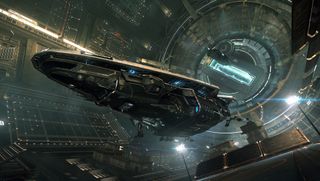
It’s like comparing FIFA with Call Of Duty. Yes, they both feature people running around but then very quickly the comparisons start to break. Okay, that’s a bit extreme, but speaking of which – Call Of Duty has now come to space. Isn’t that interesting and exciting? So I’m trying to look at the parallels, because
I think you could just as easily say that the latest Call Of Duty has an overlap in the same way No Man’s Sky has. What we’re all trying to do is creatively provide a world and tell a story for people to get engaged with, and each one is different and not every one appeals to everybody, whether it’s FIFA or COD or Elite.
As a gamer, I actually really like it when games are different. It does annoy me when two games try and copy the same idea, and it does happen from time to time. I won’t name them, but I always think that’s a shame. I’d much rather they’d actually blaze their own trail, because if the first game is not really my cup of tea then the next one won’t be. Ironically, I felt the last few Call Of Duties were quite same-y – I’ve not yet played Infinite Warfare because I’ve been busy playing Elite and another game we’re making!
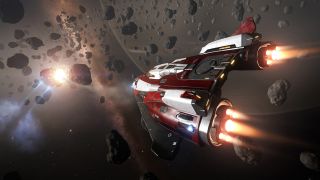
OPM: Given that this is your work can you still play Elite Dangerous: Horizons for fun and enjoy it? Or is it hard to shrug off work mode?
DB: I’ve played a lot in the Betas so I often end up doing obscure things just to check that they work. But that’s a sort of different thing – but I do play a lot in the main game as well as Commander Braben, and I tend to go out to places. I generally go to where there’s something new happening and end up chatting to people.
OPM: Can the game still surprise you, two years since it first launched?
DB: I have been surprised! I was delighted by a story that a lot of people wanted which was about the space station Jaques, which is now a long way away in this area called Colonia. We had about 40,000 players travelling out there taking part in a Community Goal to supply the station. That’s 12 hours solid gameplay, just to get there, so to have so many people wanting to take part in what I thought was a very obscure Community Goal was really good, because it shows the level of excitement and engagement and also what we’ve been trying to do is make sure we’re providing the things that those people want to make the game rich.
The rise of strange things happening around Merope and Maia in the Pleiades is also exciting because there’s a big story happening there. I’ve gone there – was there right on the first barnacle and met quite a lot of players – and it’s bizarre because it’s not a surprise to me because I know what’s there, but in terms of meeting people I find it really interesting just chatting, seeing what they think and why they came. My surprise comes from the ingenuity of players to solve puzzles. We’re making things in the game now that are way harder than we would have done a while back, just to set a challenge to people.
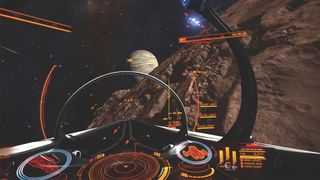
OPM: You’ve got more features planned for future updates, including multi-crew ships – could you go into more details about what we can expect to see being added to Elite?
DB: Well, I do want to be careful about announcing features, but the way I’d like to frame it is just by looking at the things that we’ve added over time. When the game was very first released on PC you couldn’t go down to planet surfaces. It’s really because I wanted the experience to be a good one and hopefully a rich one, and there were a lot of things that we needed to do to make that possible. There are a lot of things that we have already talked about that are somewhere in our future road map, without saying how far off: planets with atmospheres, gas giants and just straightforward richness of interaction between the players.
Multi-crew will come to PlayStation, where you’ve got multiple people in the same ship. That’s a very interesting experience as a player, just from the social side of it and going exploring. Think of it in terms of different roles that are in the ship: controlling the helm, controlling the weapons... I don’t want to go too deeply because obviously there’s a lot that we’re going to talk about [later], but, yes, you’ll be able to work together on the ship. I also imagine there’s a mentoring role here as well, where one person can help out. You could just go along almost like a passenger to see what they’re doing, how they’re doing it, and to see some of the things that they can see. If you’re just a beginner, that’s a fun way of learning.
And there are aliens. That will change the way a lot of people choose to play the game because we will see the rise in the military and we may see people looking at the world differently. There’s a current sort of a cold war, almost, between the Empire and the Federation, which is hotting up a bit at the moment. People don’t really know where the aliens are going to go, but then as that gradually changes... how will that change the game?
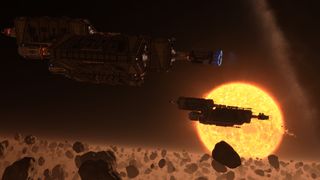
OPM: And given all this peering into the future, what would you want, as a developer, from the next PlayStation console?
DB: A machine that has plans for the future built into it, because the world of technology is continuing to change. Looking at what Sony is doing now with PlayStation 4 Pro is very interesting, where you’ve actually got two machines that are compatible but at a different power point, because what that enables Sony to do in a really good way is to plug in to the rapid evolution of technology. It doesn’t have to be annual – it could be a two-year, three-year tick.
I find it quite frustrating when my games library becomes obsolete, but I can’t bring myself to throw it away. When do you disconnect your games machines of the older generation? To be able to play old games is great. If you think of it that way, and think of PS4 Pro as being backwards-compatible, that is a lovely trajectory. At some point in the far future, it could almost end up with minimum spec [situations]: so this game needs PlayStation Pro 1 or higher, for example. I’d rather it did that.
At some point there might be a PS5, but this is a good way of extending cycle in a way that doesn’t punish people, because we’ve got some very big, very high-demand technologies coming like 4K, 8K, VR and AR, which are very, very power hungry. It future-proofs the technology.
The other thing I’d like to see is much more ability to cross-play outside the domain, with other players, because there’s this whole “Oh, I’m playing on PlayStation” barrier and frustration. Things are changing like that in a really good way.
This article originally appeared in Official PlayStation Magazine. For more great PlayStation coverage, you can subscribe here.
Most Popular




